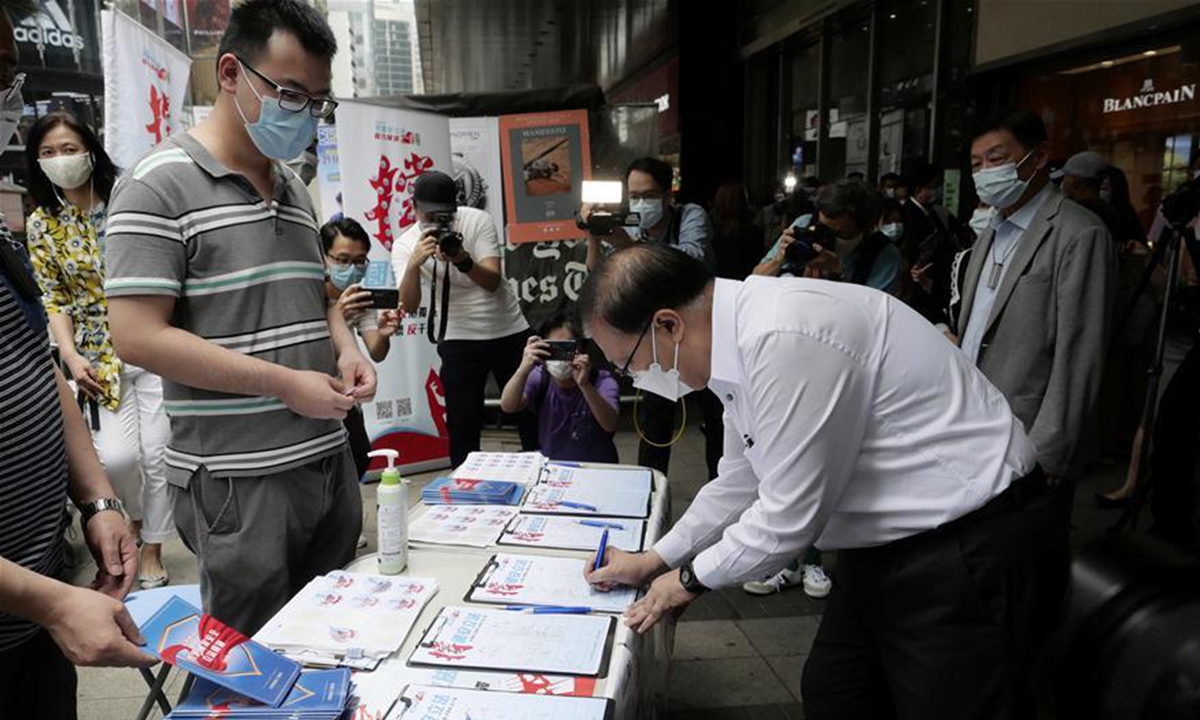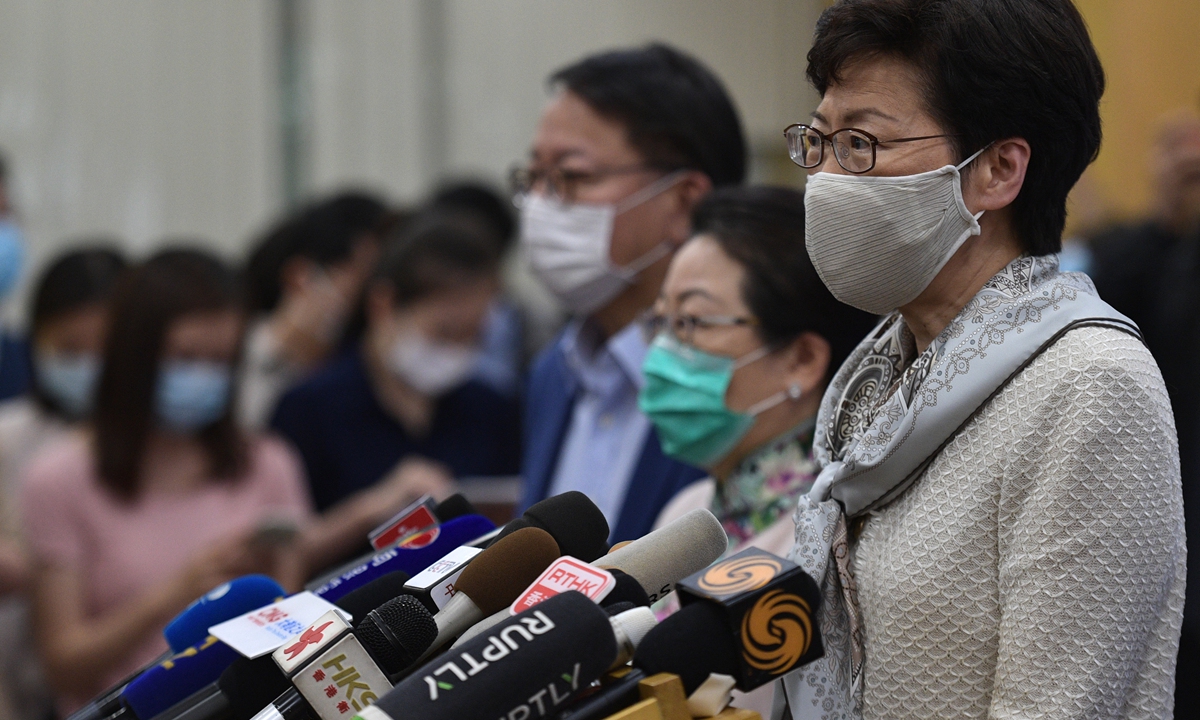Natl security law for HK submitted to top legislature, likely to be 'enacted by end of this month'
By GT staff reporters Source:Global Times Published: 2020/6/18 21:58:40

Tam Yiu-chung, a member of the National People's Congress Standing Committee, signs a petition in support of the national security legislation at a street stand in Hong Kong, south China, May 29, 2020. (Xinhua/Wang Shen)
Just shortly before the draft of the national security law for Hong Kong was submitted for deliberation to China's top legislature on Thursday, the G7 nations urged China to reconsider the law, the latest move of interference in China's internal affairs by those nations which analysts said will only make China more determined in accelerating the enactment of the law.
China's draft of the national security law for Hong Kong has been submitted for deliberation to the ongoing three-day 19th session of the Standing Committee of the 13th National People's Congress (NPC), according to the spokesperson's office of the Legislative Affairs Commission of the NPC Standing Committee.
The draft of the national security law makes clear provisions on preventing, stopping and punishing four types of criminal acts in the Hong Kong Special Administrative Region (HKSAR) - acts of secession, subversion of state power, terrorist activities and collusion with foreign forces to endanger national security.
The draft is an important piece of legislation aimed at implementing the NPC's decision on establishing and improving the legal system and enforcement mechanisms for the HKSAR to safeguard national security.
The national security law was not on the official agenda when China announced the session last week, but analysts said that the draft could be proposed by the chairman of the NPC Standing Committee during the session.
Ahead of the 19th session, Yue Zhongming, spokesperson for the Legislative Affairs Commission of the NPC Standing Committee, said speeding up the formulation of national security law for Hong Kong has been added to the NPC Standing Committee's 2020 work plan.
Chinese analysts who believe the legislation has entered the fast lane, said that legislators are likely to further accelerate the legislation process so that the law could be enacted as early as the end of this month.
Tian Feilong, a Hong Kong affairs expert at Beihang University in Beijing, told the Global Times on Thursday that this is the first step of three deliberations stipulated by the law, and the draft is likely to go through one or two more readings before being submitted for a vote given the law's impact and urgency.

Hong Kong's Chief Executive Carrie Lam speaks during a briefing at the Hong Kong Special Administrative Region office during her visit in Beijing on Wednesday. She said she is committed to fully supporting and pushing forward the formulation of the national security law and she condemned the US and the UK for their double standards on the issue. Photo: AFP
Normally, drafts go through three readings, but it can be reduced to two readings for drafts over which legislators have fewer disagreements, and one reading for drafts targeting a single issue, Tian said.
Li Xiaobing, an expert on Hong Kong, Macao and Taiwan from Nankai University in Tianjin, told the Global Times on Thursday that the legislation process could still be accelerated through additional meetings even following the normal procedure of three readings.
Several Hong Kong legal experts told the Global Times that the Standing Committee of the 13th NPC is likely to hold another session at the end of this month, during which legislators may vote for the draft law.
Foreign interference
The foreign ministers of the US, Canada, France, Germany, Italy, Japan, the UK, and the EU's High Representative issued a joint statement on Wednesday, in which they claimed the national security law for Hong Kong doesn't conform to Hong Kong's Basic Law and China's international commitments under the principles of the Sino-British Joint Declaration. They also stated the law risks seriously undermining the "one country, two systems" principle and the territory's high degree of autonomy.
The G7 statement at the moment is more of a gesture to international anti-China forces and the Hong Kong opposition, but it did not have the capacity to take any substantive measures to intervene in China's affairs, Tian said.
Tian said that the joint statement was triggered by US strategic goals and pressure, as the US is the mastermind of interventionism, while other G7 countries simply toed the line under its pressure. Top leaders from countries like Germany and Japan have been reluctant to express their stance on the Hong Kong matter, as it is purely China's internal affairs.
The national security law for Hong Kong was submitted for deliberation after senior Chinese diplomat Yang Jiechi met with US Secretary of State Mike Pompeo on Tuesday and Wednesday, which could be seen as an occasion for both sides to put "all their cards" they have on the table, Li said.
"It's now crystal clear what Beijing's bottom-line is. No matter how much effort Washington made in lobbying its major allies, the Chinese government will only push forward with the formulation of the law, or even accelerate the process in spite of external pressure," Li said.
Kishore Mahbubani, a distinguished fellow at the Asia Research Institute of the National University of Singapore, and a veteran diplomat, told the Global Times in a written interview recently that the US believes both the recent unrest in Hong Kong and the national security law for Hong Kong provide a convenient propaganda weapon to use against China, especially in the Western world.
He said that Hong Kong has become a political football that will be kicked around in the geopolitical contest. Sadly, the football will get damaged. If Hong Kong people don't understand that they have become a pawn in a geopolitical contest, they may come to grief.
When the Chinese government unveiled the decision to establish the national security law for Hong Kong in May, countries like the US and the UK rushed into expressing their concerns regarding the law, even calling it controversial and mulling to come up with immigration policies for Hongkongers and revoke Hong Kong's preferential treatment as a separate customs entity. However, German Chancellor Angela Merkel is unwilling to follow suit.
"There is no reason for countries like Italy and Germany to follow the US' lead in pressuring the Chinese government over the Hong Kong matter given their limited interests in Hong Kong. This is more akin to a 'favor' they offered to Washington while thinking about how to fix the delicate situation with Beijing" Li said.
No matter how hard external forces try to pressure the Chinese government, it has prepared for the worst-case scenario, the expert noted. "A more hard-line US-led coalition curbing China, more quickly the law would be passed," Li said, adding that no one should undermine China's determination in safeguarding its sovereignty and national security.
If the US and UK continue further, China could take countermeasures to sanction their officials, organizations, and restrict them from entering China and even investigate their properties, Tian said.
American and British firms that have hurt China's interests, such as UK's HSBC bank, are most likely to face sanctions, Tian said.
Many Western countries who have been supporting the demonstrations and disruptions in Hong Kong believe that their interests are best served by Hong Kong's instability as it's seen as an embarrassment for China. On the contrary, the stability in Hong Kong and its continuation as a vibrant commercial and financial center could enable Western companies to better fully benefit from China's growth, Mahbubani said.
RELATED ARTICLES:
- Draft HK national security law submitted to top legislature for deliberation
- Top legislature may propose draft of natl security law for HK at this week’s session: HK coalition head
- FM warns UK of China's determination to pass national security law for HK
- National security law to end Hong Kong chaos soon: Global Times editorial
Posted in: POLITICS,HK/MACAO/TAIWAN